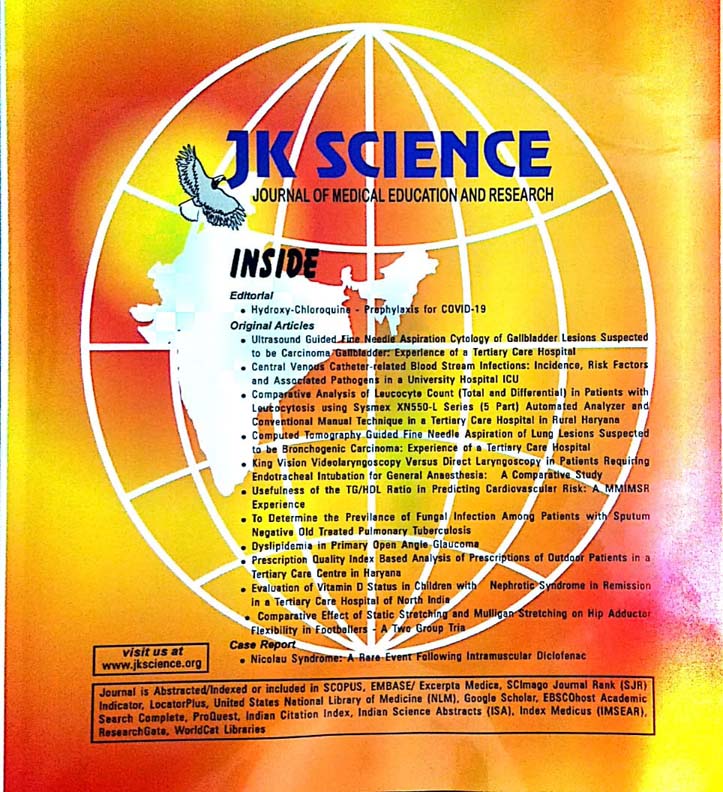
pISSN: 0972-1177

Dr. Annil Mahajan
Editor-in-General

Dr. Sudhaa Sharma
Editor-in-General
Editorial Policy
We expect the highest ethical standards from authors, reviewers and editors when conducting research, submitting papers and throughout the peer-review process.
Open Access Statement and Licensing
This is an open access journal, and articles are distributed under the terms of the Creative Commons Attribution-NonCommercial-ShareAlike 4.0 International License (CC BY-NC-SA 4.0), which allows others to remix, transform, and build upon the work, and to copy and redistribute the material in any medium or format non-commercially, as long as appropriate credit is given to the original author(s) and source, and the new creations are distributed under the same license. There is no requirement for registration or login to read or download the articles.
Data Archiving and Backup Policy
Data archiving and backup are very important steps to protect articles from being lost due to system failures or any other reasons. From the start of publication till date, the data of all articles being published in “JK Science” webpage. From January 2018 onwards we have started uploading full text of all articles on Index Copernicus publisher panel. This data can be retrieved at any time by searching the journal within Index Copernicus page without need for login, and clicking on the issues link.
Ethics
We are committed to meeting and upholding standards of ethical behavior at all stages of the publication process. We follow closely the industry associations, such as the Committee on Publication Ethics (COPE), International Committee of Medical Journal Editors (ICMJE) and World Association of Medical Editors (WAME) , and also Consolidated Standards of Reporting Trials (CONSORT) that set standards and provide guidelines for best practices in order to meet these requirements.
When reporting experiments on human subjects, indicate whether the procedures followed were in accordance with the ethical standards of the responsible committee on human experimentation (institutional or regional) and with the Helsinki Declaration of 1975, as revised in 2013.
Ethics Committee Approval
The authors should indicate that ethical approval of the study has been granted and must include a statement on ethics approval at the beginning of the Methods section. In addition, for studies conducted on human participants you must state clearly that you obtained written informed consent from the study participants. If you have approval from a National Drug Agency (or similar) please state this and provide details, particularly, when discussing the use of unlicensed drugs. If necessary, the Editors may request a copy of such approval and any consent forms.
Protection of Patients' Rights to Privacy
Identifying information should not be published in written descriptions, photographs, sonograms, CT scans, etc., unless the information is essential for scientific purposes and the patient (or parent or guardian, wherever applicable) gives informed consent for publication. Keep copies of patients’ consent forms on which patients or other subjects of your experiments clearly grant permission for the publication of photographs or other material that might identify them. If the consent form for your research did not specifically include this, please obtain it or remove the identifying material. The journal abides by ICMJE guidelines:
Rebundant or Duplicate Publication
Submitted manuscripts should not have been published or currently submitted or already accepted for publication elsewhere either as a whole or in part. Duplicate publication is a violation of the code of publication ethics and will be grounds for prompt rejection of the submitted manuscript. If the editor was not aware of the violation and the article has been published, a notice of duplicate submission and the ethical violation will be published.
Permission to Reproduce Previously Published Material
Permission is required to reproduce material (such as illustrations) from the copyright holder. Articles cannot be published without these permissions. It is the responsibility of authors/ contributors to obtain permissions for reproducing any copyrighted material. A copy of the permission obtained must accompany the manuscript.
Source of Support and Conflict of Interest
All authors of articles must disclose any and all conflicts of interest they may have with publication of the manuscript or an institution or product that is mentioned in the manuscript and/or is important to the outcome of the study presented. Clearly mention your source of support with any form either Institutional, Company, Government, NGO, National - International etc. Even if, there is no any form of support, be mention as - Nil.
For any matter concerned with Conflict of interest - by any form - either from author, department, group, colleagues, head of the department, administration etc. directly or indirectly showing such interest, if noted by any person, authority like Institution, Dean, MCI, DNB BOARD etc., Editorial Board will follow strict action against such author
Retraction Policy
Journal abides by COPE Retraction Guidelines.
Punishment from Our Board
If the article submitted is found involved in Unethical Publication Practises of any nature and found indulged in Plagiarism, and the Editorial Board finds any such matter at any stage of manuscript processing or even after publication, the following strict actions may be taken:

pISSN: 0972-1177

Dr. Annil Mahajan
Editor-in-General

Dr. Sudhaa Sharma
Editor-in-General
|
Editors-in-General |
Editors-in-Chief |
Managing Editor |
Statistical Editor |
Editorial Secretaries |
© 1999 to Present, JK Science: Journal of Medical Education & Research
pISSN: 0972-1177
Published by Dr. Annil Mahajan from Jammu (J&K), India

This work is licensed under a Creative Commons International License
CC BY-NC-SA 4.0
